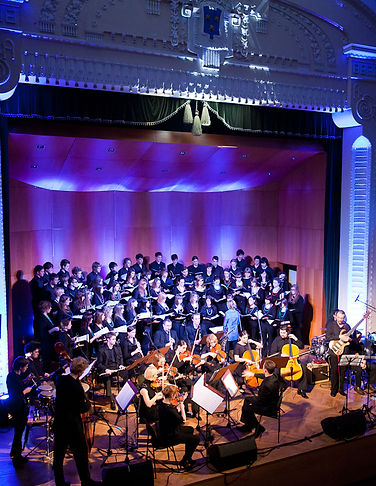
Matevž Goršič
music pedagogue / composer / pianist

1. Veni, Veni Emmanuel
2. Angels We Have Heard On High
3. A Child This Day Is Born
4. Two Angels walking
5. Sing and Say Halleluyah
6. Resonet in laudibus
The Christmas cantata by composer Matevž Goršič is a vocal instrumental work for choir, symphony orchestra and jazz / rock ensemble. The work was created in collaboration with the House of Culture Celje and is the first such work by the composer. The compositions are written in different musical styles, as the composer tried to touch on different musical cultures, different religious divisions, which are united by the Christian church. Thus, the first song Veni, Veni Emmanuel is written in the Catholic spirit. It is a well-known Advent text from the 12th century, which is often used as a preparation for Christmas time.
The second composition is Angels we have heard on high and is written in the spirit of the Anglican Protestant Church. The text, which has been set to music several times, comes from the Gospel of Luke. The third song A child this day is born is written in the spirit of gospel (gospel) music. It is a musical genre that developed in the United States in the mid-1950s. It comes from a traditional black spiritual song and blues. It is most prevalent within the American Baptist Church. The Orthodox Church is one of the three most widespread Christian divisions, so the composer decided to write an adaptation of the Serbian Orthodox anthem. Two Angels of the Walker is one of the most beautiful Serbian Christmas songs, the author of which is unfortunately unknown. Sing and say halleluyah is a translation of an Arabic text that is an integral part of the Christmas Mass as part of the Syrian Orthodox Christian Liturgy. This Christian church is also one of the more widespread Christian divisions, so the composer decided to present part of the Christmas atmosphere in Arabic melody as well. The last, concluding composition is again Catholic - Resonet in laudibus (Let the voice of praise resound). It is a 14th century choral set to music by Jacobus Gallus, among others.
Abstract from the article in Novi tednik on 24 December 2010, by publicist Branko Stamejčič
The Christmas fairy tale in the production of the cultural association Triangel exceeded the otherwise high expectations.
The cultural connection of the three municipalities, called Triangel, is on the stages of the Velenje House of Culture, Celje House and House II. Slovenian camp in Žalec weaved a Christmas fairy tale, which was even more fairytale than expected.
Sometimes a person simply runs out of words and superlatives to describe the atmosphere, richness and beauty he has experienced. This happened during the Christmas fairy tale of the Celje House of Culture, the Velenje Festival and the Žalec Institute for Culture, Sports and Tourism. Already with the first joint project, the Triangel alliance has luxuriously shown the production potential of this area, which is often unjustly neglected on the cultural map of Slovenia. With a heartfelt concert of Christmas songs performed by the children's choir of the Velenje Music School, the Anton Schwab Choir and the chamber music ensemble of the Celje House of Culture and the jazz of the Tuned fish ensemble, the performers took the audience to a time of anticipation, a time of miraculous birth of the Son of God. different cultures and Advent. But all this was only an introduction to the Christmas cantata by the Celje pianist, music pedagogue, musician and composer Matevž Goršič. With six songs, he took us from Europe to America, from the Balkans to the dusty Vatican corridors, all the way to the Arab world, intertwined in anticipation of a Christmas miracle. With a single tradition - music is universal and able to bridge religious, cultural, linguistic and all other differences.

The Bishop of Celje dr. Stanislav Lipovšek was surprised and happy to be at one of the three concerts. “I congratulate all those who have prepared this program, this genus, which consists of classics, from choral to the most modern musical approaches, which appeal especially to young people. How they came to life and we seniors too, moved us to tears. And let’s not forget the texts that are biblical, from Latin to Arabic. I also enjoyed this international context, which showed the richness of celebrating Christmas throughout Europe and the rest of the world. I am grateful and I will say in many places what beautiful things we can prepare in Celje. "

The fusion of choral singing, chamber orchestra and rock band has, I dare say, shown the light of the future. Both choirs, the Velenje children's choir under the baton of Manja Gošnik Vovk and the Anton Schwab choir, conducted by Alenka Goršič Ernst, were top-notch. The House of Culture Orchestra, despite its numerical modesty, has proven the strength of a line-up of professional musicians and music students. Soloists Tanja Ravljen, Kristina Strašek, Aljaž Pavlin and Sergije Lugovski and Tuned fish singer Nuša Ofentavšek excelled.
Matevž Goršič's cantata is an interesting set of melodies of the main Christian divisions. He used the musical Advent motifs of the Orthodox Church, the Eastern Assyrian Church, the Protestant, the Baptist, and of course the Roman Catholic. He transformed the motifs into modern very pleasant musical language. The Christmas spirit comes through these soundscapes differently, but very interestingly. He created a lot of hard work for performers, a combination of the sound of more popular melodies, but presented with all the seriousness required by the Christmas carols of sacral content, which determine our musical tradition from the beginning to the present day. "
Gregor Deleja.
